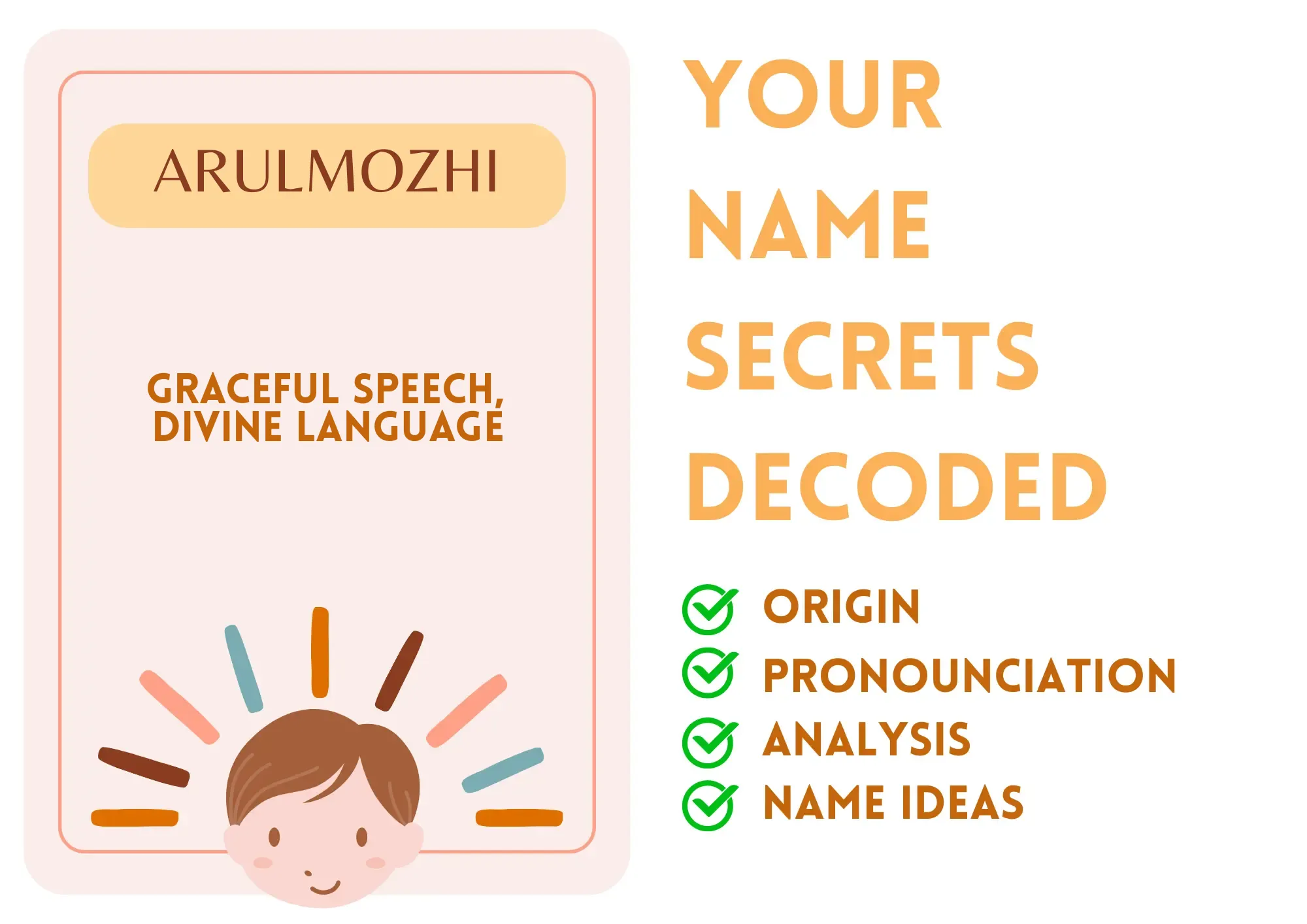
Arulmozhi
Arulmozhi is a distinguished name loaded with cultural richness and historical significance, originating from Tamil Nadu, India. The name translates to "graceful speech" or "divine language" in Tamil, symbolizing eloquence and wisdom. It can be used for both genders but is primarily masculine. Historically, the name is famously associated with the Chola king Arulmozhi Varman, also known as Raja Raja Chola I, one of the greatest rulers in South Indian history. Arulmozhi is viewed positively, suggesting intelligence, grace, and a charmed disposition. It is meaningful and easy to pronounce with a rhythmic cadence, making it a cherished choice for Tamilian parents.
Basic Information
Gender: Boy
Sounds Like: Ah-rool-mo-zhi
Pronunciation Explanation: The emphasis is placed on the first syllable 'Ah', followed by 'rool', and the final syllable is pronounced 'mo-zhi' with a soft 'zh' sound typical of Tamil phonetics.
Summary and Meaning
Meaning: graceful speech, divine language
Origin: The name Arulmozhi has its origins in the Tamil language, an integral part of the Dravidian culture in South India.
Usage: While traditionally a masculine name, Arulmozhi can be unisex. It is occasionally used for girls, highlighting a balance of grace and intellect.
Name Number (Chaldean)
Name Number (Pythagorean)
Name Constellation (Nakshatra)
Name Zodiac Sign (Rashi)
Popularity (Global Rank)
Overall: 48571
Boys: 54235
Most Popular in
Religious and Cultural Significance
Religion: Hindu
Background: Often used within Hindu communities, Arulmozhi reflects values such as eloquence, wisdom, and divine grace, aligning with Tamil cultural ethos.
Cultural Significance: Arulmozhi carries significant cultural importance, especially in Tamil Nadu, due to its association with Raja Raja Chola I, thereby evoking themes of leadership and legacy.
Historical Significance: Historically, Arulmozhi is renowned as the birth name of Raja Raja Chola I, a remarkable ruler of the Chola dynasty who was instrumental in expanding the Chola Empire and promoting Tamil culture and architecture.
Popular Culture
Literature and Mythology: Arulmozhi is a key character in the beloved Tamil literary classic 'Ponniyin Selvan' by Kalki Krishnamurthy, often referenced in Tamil cultural discourse.
Movies and Television: The character Arulmozhi Varman from historical tales is depicted in films and plays, underlining his valiant and sagacious persona.
Feelings and Perceptions
Perception: The name Arulmozhi is imbued with a sense of respect and awe. It is perceived as scholarly and regal, given its meanings and cultural connections.
Positive Feelings: Eloquent, graceful, thoughtful, culturally resonant, historic, sagacious.
Negative Feelings: Might be challenging for non-Tamil speakers to pronounce accurately.
Practical Considerations
Ease of Writing and Calling: Arulmozhi is relatively easy to write in Roman script, though the unique Tamil pronunciation might require practice for non-native speakers.
Common Typos and Misspellings: Arulmozi,Araulmozhi,Arlumozhi,Aruumozhi
Common Nicknames: Arul,Mozhi,Ara
Arulmozhi Popularity
Arulmozhi Usage and Popularity By Country
| Country | Rank (Overall) |
|---|---|
| India | 9923 |
| Singapore | 16880 |
| New Zealand | 20916 |
| Ireland | 23749 |
| Sweden | 31840 |
| United Arab Emirates | 32353 |
| Australia | 68209 |
| Netherlands | 70785 |
| Germany | 81441 |
| Canada | 96992 |
Arulmozhi Usage and Popularity By City
| City | Rank (Overall) |
|---|---|
| Chennai | 2107 |
| Coimbatore | 1851 |
| Selam | 746 |
| Bengaluru | 11584 |
| Cuddalore | 562 |
| Tiruchchirappalli | 1507 |
| Tiruvallur | 1428 |
| Thanjavur | 702 |
| Vellore | 1660 |
| Krishnagiri | 673 |
Compatibility Analysis
Famous Persons Named Arulmozhi
No results found for Arulmozhi.
Related Names
Similar Sounding Names:
Arumugam,Arulmani,Arulselvan